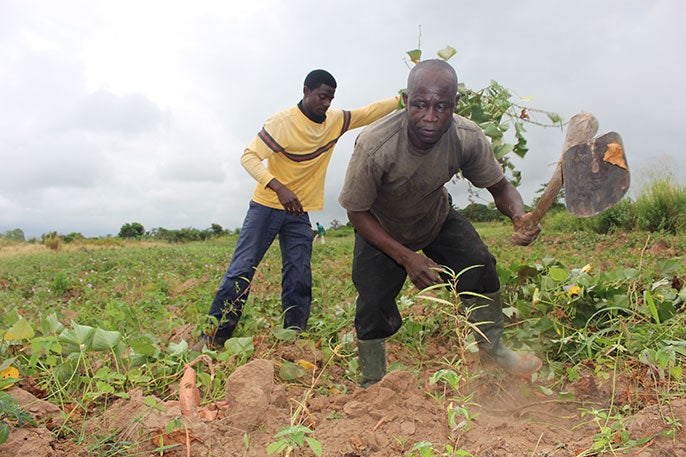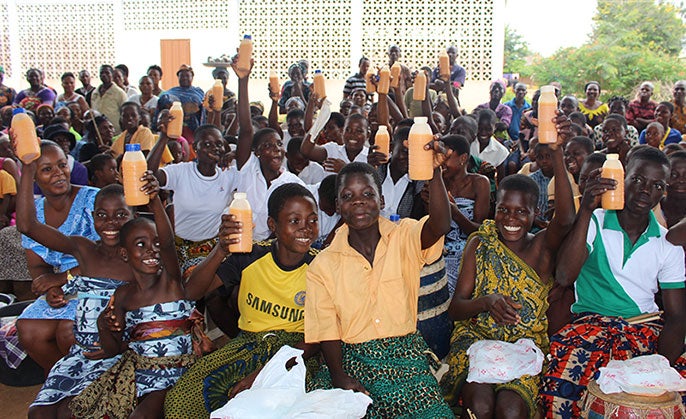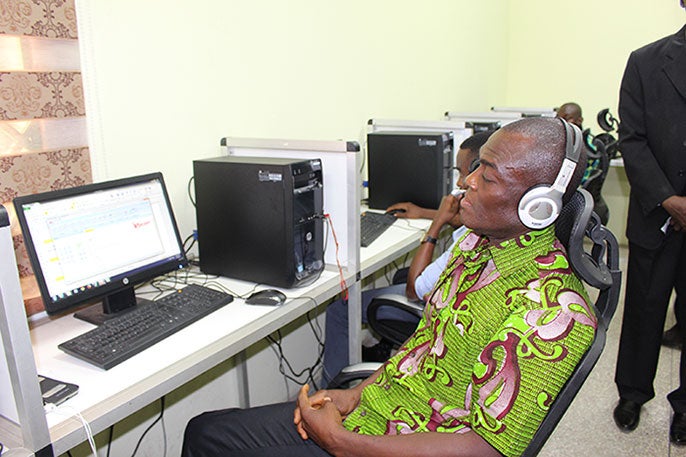
What happens when you help a farmer succeed?
You create opportunities, not just for the farmer, but also for his family, often improving their financial standing, health and educational prospects.
But the impact goes much further than that. When you give a farmer tools to succeed, you can help grow prosperity in his community, and build a food system that can feed everyone, every day, everywhere—nutritiously and sustainably.
This is the story in West Africa, where the World Bank-funded West Africa Agriculture Productivity Program (WAAPP) has helped 13 countries generate, improve and disseminate agriculture technology to pave the way for a food-secure future for Africa. Already, WAAPP has developed 116 technologies that have been adopted by and directly benefited up to 2.5 million people across West Africa—or 17 million people in total, if you count both direct and indirect beneficiaries. WAAPP has also improved productivity on up to 2.74 million hectares of farmland and is estimated to have increased food production in West Africa by more than 3 million tons.
We’ve been in Ghana for the past week, reviewing the many notable successes of one of WAAPPs early participants and biggest success stories.
As a designated National Center of Specialization, Ghana has developed high-impact innovations in root and tuber crops. To date, Ghana’s program has generated and released into the public four varieties of cassava (and there are six newly approved and waiting to be officially released) and four varieties of sweet potato (eight more were released pre-WAAPP) that are climate-resilient, high-yielding, nutritious and liked by consumers. These varieties are being shared across borders and being planted in other WAAPP countries as well.

The program in Ghana is also revitalizing agricultural research so that a new generation of agricultural scientists can emerge. It is financing 100 young scientists who are pursuing their MSc and Ph.D. programs, and supporting a state-of-the art biotech lab for scientists to use at centers like the CSIR-Crops Research Institute in Ghana.
Through its e-Agriculture program, WAAPP Ghana is taking advantage of widespread cellphone use by leveraging ICT tools to help farmers. By calling a toll-free number or accessing an online platform, farmers can get real-time advice in 6 dialects on best farming practices. To date, the e-Agriculture program has 120,000 subscribers and has logged 1.76 million calls on a variety of issues, from land preparation to pest management.
Ghana has also developed a cassava harvester to make the harvesting process less burdensome for farmers and in addition to many other yield enhancing agronomic practices, is promoting vine technology for seed yam production to easily multiply planting material so that more farmers get access. Now well into its second phase, the program is expanding its focus to vegetable production and guinea fowl raising in order to make agriculture a more attractive and productive sector for the youth—the next generation who will take African agriculture into the future. The guinea fowl program is particularly successful, having generated a vaccine against Newcastle disease and developed a ‘startup’ kit that includes an incubator, dewormer, feed and vaccines that puts would-be guinea fowl farmers on the path to a productive livelihood. The results have been astounding for the beneficiary farmers who have experienced a large jump in their incomes, as well as other guinea fowl farmers in their communities, who have been able to use the incubators for their own eggs. Forty guinea fowl farmers have benefited so far and many more are clamoring to be part of the program.

So what has happened as a result of WAAPP’s work in Ghana to help farmers succeed? Our big takeaway is that the direct beneficiary farmers represent just a fraction of WAAPP’s positive impact in Ghana.
For the farmers we met in the Volta region, Bawku and Kumasi, WAAPP interventions have resulted in more productive farms, higher incomes, and education and security for their families. For those in their communities, it has created a sense of shared prosperity—many of the farmers we met shared their resources and knowledge with friends and neighbors, letting others use their equipment, freely giving away vines for planting and teaching best practices they learned from WAAPP agronomists. For Ghanaians and other countries in West Africa, it has meant access to more nutritious food, such as the Vitamin A-rich orange-fleshed sweet potato, which can help reduce malnutrition for children. And last but not least, for the scientists, agronomists and various officials working with WAAPP in Ghana, it is an opportunity to harness their love for their country and for Africa into helping build food system that can feed their fellow citizens nutritiously, affordably and sustainably. Our WAAPP partners in Ghana are very passionate about what they do, and this is promising not just for the program but for the future of agriculture in Ghana.



Join the Conversation